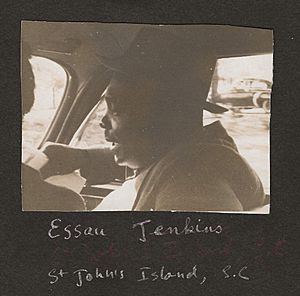Esau Jenkins facts for kids
Esau Jenkins (July 3, 1910 – October 30, 1972) was an important African-American leader from South Carolina. He was a businessman, a local preacher, and a community organizer. He started many groups and places that helped make life better for people on the Sea Islands. He worked to improve education, housing, health, and money matters for his community.
Contents
Helping Kids Get an Education
Esau Jenkins grew up when schools were separated by race, which was called segregation. It was hard for him to get a good education. But he knew how important learning was. He wanted to make sure his children and other kids could go to school.
In the 1940s, Esau and his wife Janie used money from their farm. They bought several buses. These buses took their own children and other kids from the Sea Islands to school in Charleston. This helped many children get a better education.
In 1951, Esau Jenkins helped create Haut Gap High School on Johns Island. This meant all children on the island could get a good education close to home. Today, Haut Gap is a special middle school for advanced studies.
Teaching Adults to Vote
Jenkins' buses also took adults to their jobs in Charleston. During these bus rides, Esau and Janie would teach their passengers. They taught them what they needed to know to pass a literacy exam. This was a test that people had to pass to become registered voters. Being a registered voter meant they could vote in elections.
Esau Jenkins saw that many adults needed help learning to read and write. He also saw they needed to understand how to vote. He met with other leaders to talk about this. They decided to create special classes for adults on the Sea Islands.
The Progressive Club and Citizenship Schools
The first of these special schools was called a citizenship school. It started on Johns Island at a place called the Progressive Club. Esau Jenkins and other families started the Progressive Club in 1948. It was a place where people could help each other. It had a grocery store, a gas station, and even rooms for classes. People could also trade goods and services there.
Famous leaders like Dr. Martin Luther King Jr. visited the Progressive Club. They took part in workshops there. The citizenship school was very successful. It became a model for other schools all over the South. These schools taught adults how to read, write, and understand politics. Because of these schools, thousands of people became registered voters.
Helping the Community Grow Stronger
Esau Jenkins also started other important groups. In 1959, he founded the Citizens Committee of Charleston. In 1966, he started the C.O. Federal Credit Union. This credit union helped people in the community get loans. They could get loans to buy homes, start businesses, buy cars, or even send their children to college. This helped many families become more financially stable.
Jenkins was also one of the founders of Rural Mission, Inc. This group helped farm workers who moved around for jobs on the Sea Islands. In 1970, Rural Mission, Inc. received money to start a health clinic. This clinic was at Bethlehem United Methodist Church. It served five Sea Islands in Charleston County: Johns Island, James Island, Wadmalaw Island, Edisto Island, and Yonges Island.
In 1972, the health clinic became its own organization. It was called the Sea Island Comprehensive Health Care Corporation. It became a full health care center for everyone living on the Sea Islands.
Esau's Businesses and Famous Bus
Esau Jenkins and his wife owned many businesses. They had a fruit and vegetable stand. They also owned a fleet of buses, a motel, and a restaurant. These businesses were in Charleston, SC, and also on Atlantic Beach, SC.
Mr. Jenkins was famous for his 1966 Volkswagen deluxe station wagon. This was a type of van, often called a VW Bus. He used it for his work in the community. On the back of the van, he had his motto printed: “Love is Progress, Hate is Expensive.”
In 2014, Esau Jenkins' family gave parts of this special van to the new National Museum of African American History and Culture. This museum is part of the Smithsonian. The van parts are now in a permanent exhibit there. It is called “Defining Freedom, Defending Freedom: The Era of Segregation.”
A special event was held on June 1, 2014, to send the bus parts to the Smithsonian. Many people attended, and local news channels covered the story. The Historic Vehicle Association and the College of Charleston helped save the Volkswagen bus. In 2019, it was added to the National Historic Vehicle Register. This means it is recognized as a very important vehicle in American history.
Legacy
Esau Jenkins passed away on October 30, 1972. He has received many awards and honors since his death. A bridge, a street, and a health clinic have all been named in his memory.
 | Emma Amos |
 | Edward Mitchell Bannister |
 | Larry D. Alexander |
 | Ernie Barnes |


